Jared Kushner's Plan For Peace in the Middle East
Spoiler alert: it's just sitting around a campfire holding hands and singing kumbaya
When I heard that Jared Kushner was tasked with bringing peace to the Middle East, I thought we were in good hands. I mean, this was the man who was also in charge of reforming the criminal justice system, ending the opioid crisis, redoing the entire federal government— I believed he could do anything!
But alas, Jared has not succeded at this job as we saw this month with the weeks-long crisis between Israel and Palestine. Although a ceasefire has been reached, the ramifications from the violence are still playing out, largely on social media and largely in the U.S.
Commenting on a topic as sensitive as the Israeli-Palestinian Conflict as someone who doesn’t have the wherewithal to not swear in front of children seems risky; I know from watching those said ramifications play out on social media that most people have very strong and personally held opinions, and anything I say has the potential to anger or alienate a number of individuals.
While I don’t practice religion, a large amount of my family is Jewish. While I’m not connected in any significant way to Palestine, I played the role of Hamas in an I/P simulation in school and, as a result of my Type-A student work ethic, thoroughly researched and came to an understanding of where the group is coming from.
By this I mean to say: I understand both sides of the conflict, but I also don’t fully agree with either which leaves me in a tricky place.
For this reason, I reached out to someone who has been a little more eloquent on this issue than I have but also wants it on the record that she is “not an expert on the situation, and some of what I am saying definitely should not be interpreted as fact (the historical stuff is, though, don’t worry).”
This week, I talked with my friend Chloe Angel who graduated in 2019 from Franklin and Marshall College with a double major in political science and Spanish. She was raised Jewish and is “definitely very much a reform Jew.”
We broke down a very brief version of the history of the Israeli-Palestinian Conflict, whether or not it’s possible to support both sides in the ongoing struggle, how to not harm other people over this conflict, and what her ideal solution for peace looks like.
Traditions and History
You all already know what my first question for Chloe is:
Emily: Do you think Jared Kushner succeeded in his job of bringing peace to the Middle East?
Chloe: So, obviously no.
More importantly: this month, there have been a number of infographics being shared on Instagram followed by a number of reactionary posts accusing those infographics of not offering enough history or context. These comments continue to feed into the notion that the I/P Conflict is something too complex to discuss unless you have devoted time to studying it.
While the history of the hostilities is complicated, the histories of all wars are. But understanding a conflict’s causes does not require a higher level of academia— just ask your dad’s shelf of WWII books.
Emily: In your perspective, as someone who has said they are not an expert on the issue, what is the loose outline of the Israeli-Palestinian Conflict?
Chloe: No question the situation is nuanced, but a huge part of what makes it so nuanced is that many people don’t consider what happened pre-Holocaust. This is gonna be long but it’s definitely the watered-down version of the history.
The conflict has been going on for thousands of years but basically, Jews living in the land considered it Israel since approximately the second millennium BCE, and the first record of the land being called Israel is from 1200 BCE. There have been conflicts since then regarding the land with repeated attempts to expel Jews, though the land was occupied by Jews primarily until around 100 CE.
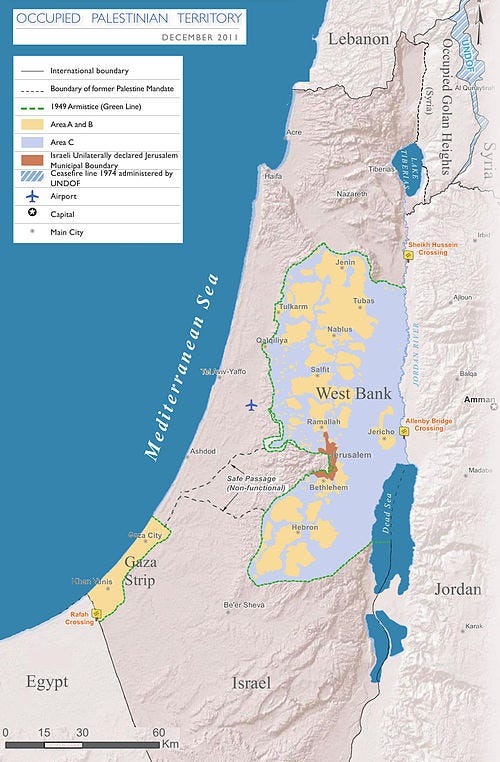
Chloe: When the Roman Empire conquered the land in 136 CE, most Jews were expelled, the province of Syria Pelaestina was formed, and the land was Christianized in the 3rd century. In the 7th century, the land was conquered by Muslims. The land switched back and forth between religious entities for centuries until it was conquered by the Ottoman Empire in 1517, and then again by Britain in 1917. From then, it was considered the British Mandate for Palestine until 1948 with the formation of Israel through a United Nations resolution.
Throughout the 19th and early 20th centuries, tens of thousands of Jews immigrated to Palestine and the Hebrew language was revived, though many were expelled again during World War I and all of Tel Aviv and Jaffa were emptied of Jews forcefully by the Ottoman Empire in 1917. Following the war and Britain’s occupation, hundreds of thousands of Jews returned to Israel but tensions between Arabs and Jews remained very high.
By 1947, there were more than 600,000 Jews living among the approximately 1.2 million Arabs in the British Mandate for Palestine. Once Israel was declared as an official Jewish state in 1948, Egypt, Lebanon, Syria, Jordan, and Iraq attacked and the 1948 Arab-Israeli War began. It ended with Israel winning and conquering much more land than was originally planned for the state, resulting in the West Bank and Gaza Strip remaining as Palestine, though neither were considered their own entities.
Jews continued to be expelled from nearby Arab countries which resulted in Israel’s population booming. Numerous wars have occurred since 1948, some of which were preemptive military strikes though others were defensive and often resulted in Israel being victorious. These wars have led to increases in Palestinian refugees leaving or being expelled from Israel and Jewish refugees migrating to Israel.
Emily: What do you see as the objective for either side? What do you see as the main disconnect between their objectives and their actions?
Chloe: I believe they have the same objective: to regain the land they believe is theirs and to live in peace.
However, their claims over Jerusalem conflict with each other which has made achieving peace quite difficult. I think that what truly prevents steps forward in the conflict is the reliance on military action and less on negotiations, along with Israel’s egregious human rights violations on Palestinians in recent years.
While in fairness, this might be a little too much history and context for an infographic, it’s certainly not convoluted enough to be gatekept, gaslit, and girlbossed.
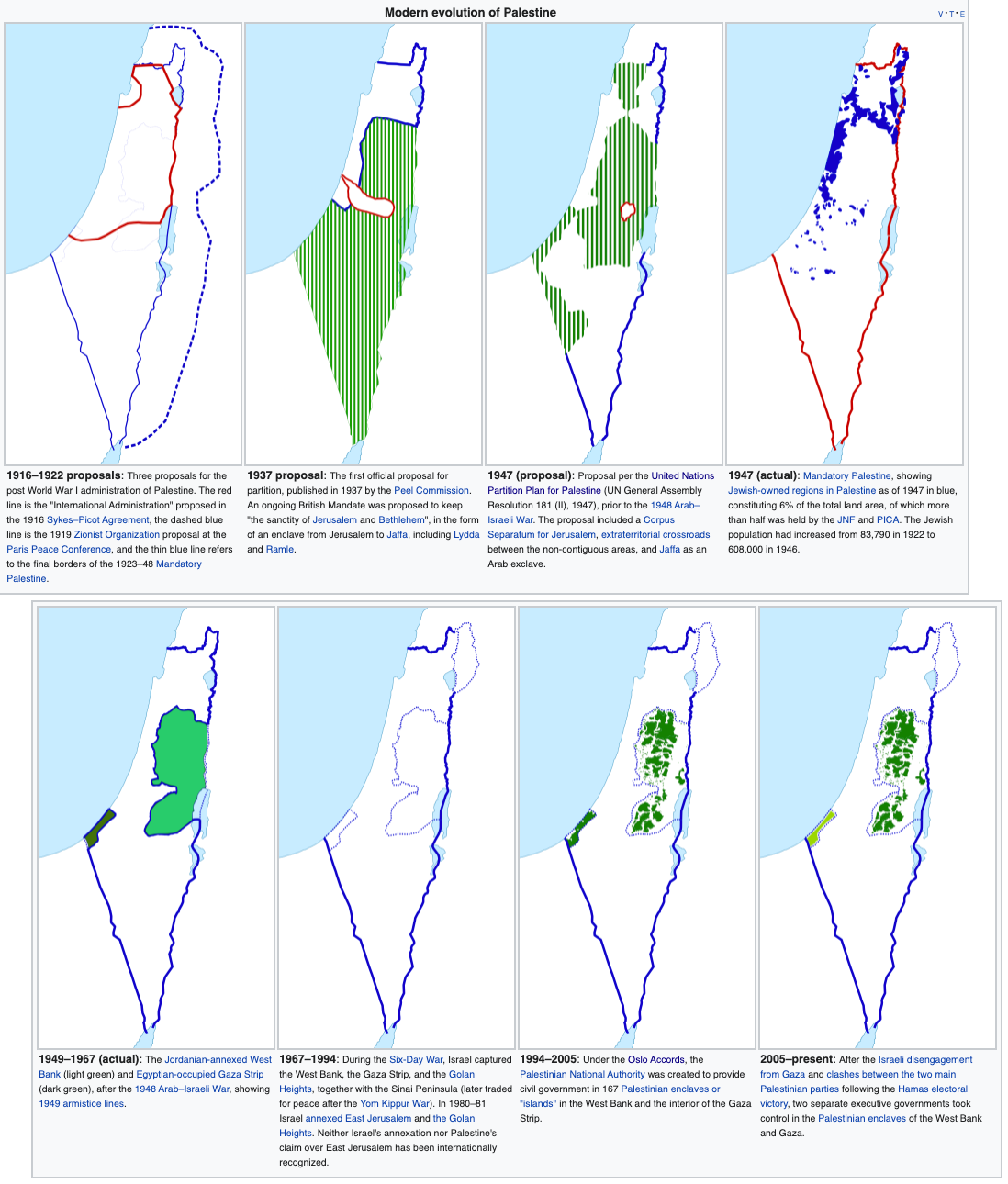
Who’s Going to Bring Peace to Instagram?
I know I’m not original when I say the relationship between my anxiety and social media has mutated in some painful ways over the course of this past year. I am someone who has found myself overthinking posts from middle and high school on any given day and last summer, I was almost never not thinking about how what I share might be perceived, if I look like a performative activist, or if I looked like a Karen Lite.
While the mentality I adopted has largely been working for me over the past 10 months (only share things that I trust and that I fully resonate with), I quite honestly had no idea what to do or say immediately in response to this month’s I/P hostilities. But a lot of other people did and the more I saw, the more uncomfortable I became saying anything at all.
I condemn antisemitism, full stop, but I also don’t believe that advocating on behalf of Palestinian human rights is an antisemitic belief, and I felt that some of the content told me I could not support both parties in the conflict. I didn’t want to do or say anything that undermined anyone else’s experience, but I also felt any opinion I did express would be received as being undermining someone, regardless.
I can only imagine others felt the same, so I decided to talk it out with Chloe.
Emily: You and I talked recently about some content being shared on social media and how a number of posts and people suggest that saying anything in support of Palestine is antisemitic. What are your thoughts on this? How would you approach a conversation with someone who holds this viewpoint?
Chloe: I believe that supporting Palestine and speaking out against the actions of Israel is absolutely not antisemitic but that many of the posts shared on social media do have antisemitic undertones. I believe many were unintentionally devaluing the lives of Israelis in their attempts to remind people of the value of Palestinian lives but, intentional or not, voicing your support of one group cannot put down the lives of another.
However, I will say some Jews consider Israel to be an integral aspect of their Judaism and, while that is not my perspective, I can understand why some feel that way. In the less than 80 years that the State of Israel has existed, Jews have been taught that Israel is a part of who we are, along with —at least in my experience— a very biased perception of Israel’s history.
Coming to terms with the fact that the country that we have been taught is the reason we are alive has been committing such horrific crimes against humanity is an incredibly difficult one. Beyond this, it is not easy to find unbiased sources that will accurately depict the realities of what happened for the purpose of unlearning and learning.
My main talking point for a conversation with someone with the above view would be to remind the individual that Palestinians are humans and as Jews, as people who have been ethnically cleansed and suffered as a result, we cannot stand for the ethnic cleansing of another group, especially by the hands of the Israeli government.
Emily: Do you think it's possible to support both sides in this conflict, or do you have to have to pick one since they are so at odds?
Chloe: ABSOLUTELY. I cannot emphasize this enough. It is without a doubt possible to be a Zionist while still supporting freedom and a right to self-determination for Palestinians.
Zionism has been treated as an incredibly dirty word in recent weeks, especially on social media. There are so many different definitions floating around the internet for Zionism but in my opinion, the one that matters and should be most heavily considered is pre-1948 Zionism: a general movement to establish an autonomous Jewish state and end the diaspora of Jewish people.
Post-1948 the word was adapted to mean the belief that the State of Israel has a right to exist and that Jews have the right to self-determination. Honestly, I support both though I more heavily support the pre-1948, in that what is most important to me is that there exists a state where Jews are free from persecution and don’t face the risk of being expelled; the exact location of that state is the less important aspect for me. But that’s just me— I absolutely don’t speak for all Jews.
If you’re interested in learning more about Zionism I highly recommend HeyAlma’s guide to Israel which includes a large section on Zionism.
Emily: People on both sides of this conversation are so willing to associate everyone with their most extreme factions (i.e. all Jewish people share Netanyahu's beliefs, all Palestinians support Hamas). You seem to have a pretty balanced judgment of the two sides— why do you believe it's important not to jump to extremes regardless of where you stand on the issue?
Chloe: This is a situation that can’t be remedied without the consideration of both sides of the issue. Only supporting Israel or only supporting Palestine will result in continued conflicts as I can’t see a realistic future where one side wouldn’t be considered and also wouldn’t continuing fighting.
To advocate for anything other than a peaceful solution would be to advocate for mass amounts of death— far more than the hundreds of Palestinians lost in the past couple of weeks.
The Pièce(s) de Résistance
Listen, I remain a bitch about Trump and not just because I think he was a bad president; I think he was bad at being the president and at being a functional human with his own genuine personality. I have layers.
But if the last five years have taught me anything, it’s to stay on top of our elected officials and make sure they act on the interests we elected them to uphold. That, and I look better with my hair long.
With this and without delving into the history of America’s relationship with Israel (which is hard because, as you all know, delving into history is about 75% of my personality), I asked Chloe for her thoughts on President Biden’s problematic actions prior and in response to this month’s I/P events:
Emily: As of today (when I'm asking these questions), Biden called Netanyahu to ask for a de-escalation of violence prior to a ceasefire, but it was also revealed that he approved of sending $735 million in military funding to Israel. I wanted to get your opinion on Biden's paradoxical approach, and any others you might have on American involvement in the conflict throughout history.
Chloe: I’m a pretty anti-military person in general so I have an issue with any American involvement in any foreign conflicts, especially since America tends to only get involved for their benefit. Therefore I’m obviously not thrilled by America’s approach to this conflict but I think Biden’s paradoxical approach exemplifies what I dislike about American intervention: Biden approved the military spending probably with the anticipation that it would make him look good for supporting Israel since Israel gets so conflated with Judaism.
However, once it was apparent to the general public wasn’t okay with this approach he backtracked likely for the potential good it could do for his image, not for the good it could do for civilian lives.
Emily: Finally, the question people literally write books on, get degrees studied, and teach lectures about: what do you think is the ideal solution to this conflict and do you think it's possible to get there?
Chloe: I have a pretty hot take on this and I think it could be possible to achieve it but it won’t be easy.
The reason the land is so desired is primarily due to Jerusalem, a religious hub for three major religions. It doesn’t make sense for just one religion to retain control of a city that is so important to three religions. Therefore, I think that Jerusalem should be treated as the Vatican City is: a city that is its own entity and is not occupied by anyone.
That way, it can be a city that each religion can have equal access and claim to. To divide the remaining land is a different story and definitely not something I can speak enough on because the agricultural and trade needs of Israelis and Palestinians would need to be taken care of.
There’s no easy way to a solution for a millennia-long issue, to be sure, and at the risk of sounding a little too kumbaya, there’s also a lot of healing that needs to take place in order to get to a place of peace. No one person can solve this issue, but no one should stop you from learning about the history of the conflict and trying to get involved however you can.
Thank you to Chloe for answering all of my questions so fully and thoughtfully and taking what is such a massive issue and making it digestible, even though she is, as she says, not an expert.
There is so much more to read and learn about the Israeli-Palestinian Conflict but if you’re looking for a good place to start, here is a reading list I nabbed from Brett Kleiman’s Instagram:





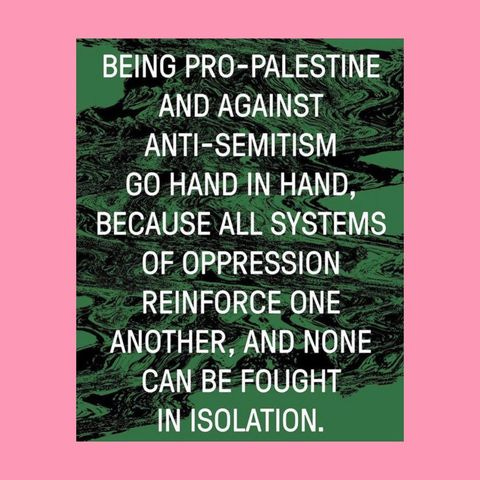
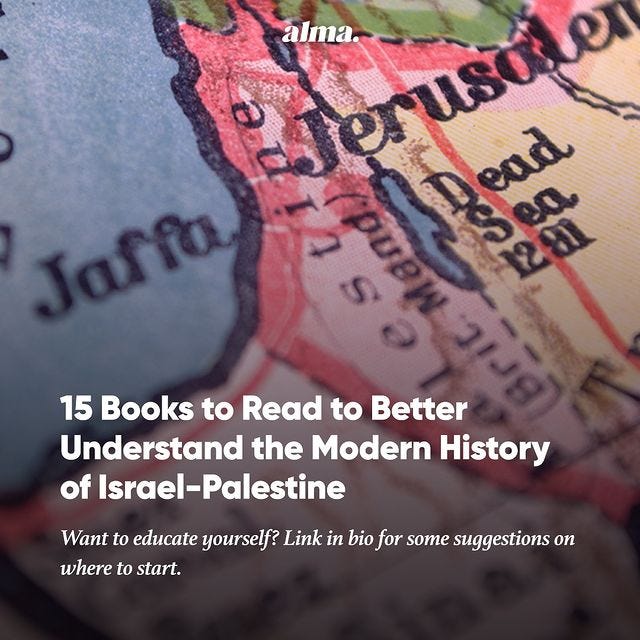
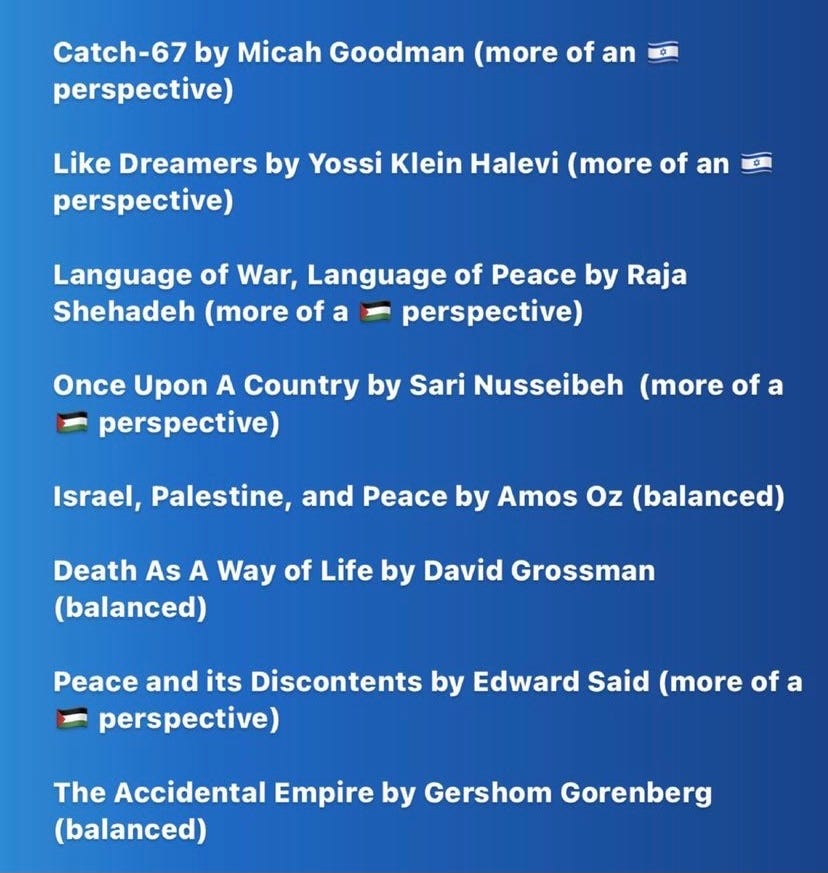
Great article, not enough people take the time to learn that the area is the birthplace of the three main world religions.